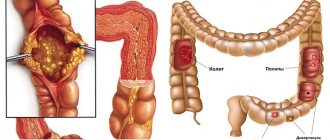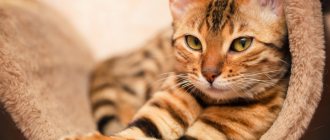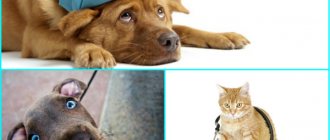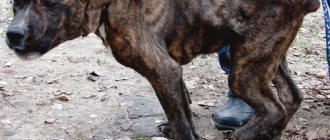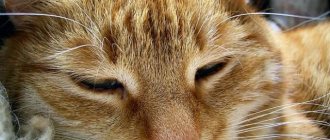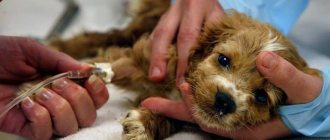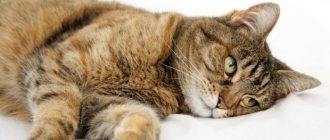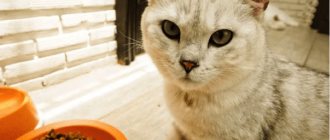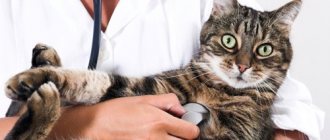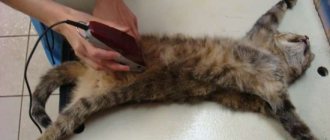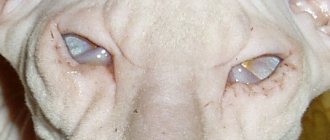You will be surprised, but the structure of the cat’s intestines is very similar to the structure of this human organ. That is why these animals can suffer from all the same diseases of the digestive tract that humans do. You shouldn’t be surprised that colitis in cats hasn’t spared these fluffy creatures. That is why it is necessary to know all the symptoms of this scourge, which can affect an animal of any age.
general characteristics
In veterinary medicine, colitis is usually understood as an inflammatory process that occurs in the large intestine of a pet. The peculiarity of localization makes colitis in cats one of the most dangerous ailments associated with the digestive system. And this is no coincidence, because it is the large intestine that is responsible for the absorption of water and the fermentation of fiber. In it, digested food is transformed into a product of defecation.
The structure of the large intestine provides for the presence of a special mucous membrane, thanks to which feces can move without obstacles to the rectum for future emptying of the pet. In the case of an inflammatory process, the normal functioning of the large intestine becomes difficult, as a result, the formation of food gruel is difficult, and the absorption of water from it slows down. It is for this reason that the mustachioed pet begins to suffer from chronic diarrhea and constipation. Owners who do not pay due attention to the symptoms and subsequent treatment of colitis in cats are at risk of their animal developing ulcers and cancerous growths in the intestines in the future.
Is colitis dangerous?
Inflammation of the large intestine disrupts its motility, affects the processes of water absorption and fecal formation, provokes diarrhea (with blood and mucus), and in a neglected state leads to weight loss and then exhaustion of the animal. In most cases, there is no serious health risk until the intestinal damage becomes deep.
Here's what it roughly looks like:
Now it’s clear why there is blood, mucus, and a foul odor in the stool.
Types of disease
Experts identify three separate classification groups that allow you to determine the type of colitis. They are divided according to the origin, course of the disease and where the source of inflammation is localized. Let's look at each group in more detail.
By flow:
- Chronic. It is characterized by extensive damage to the digestive tract, long treatment and frequent relapses.
- Spicy. Inflammation of the large intestine, which occurs spontaneously and does not last very long. It can occur in a kitten due to the harmful effects of parasites and intolerance to dairy products. In an adult cat - due to eating a dead mouse, spoiled food and toxic substances.
By origin:
- Viral. An infection enters the intestines, causing an inflammatory process.
- Toxic. The animal eats poison or chemicals that cause poisoning.
- Ulcerative. Due to the development of ulcers inside the digestive tract.
- Ischemic. The pathology occurs against the background of inflammation of the pet's abdominal aorta.
- Bacterial. Bacteria that enter the colon, such as salmonella or yersinia, provoke pathological reactions.
According to the location of the inflammatory focus:
- Proctitis is an inflammatory process on the rectal mucosa.
- Typhlitis - occurs due to irritation of the mucous membrane of the cecum.
- Pancolitis is an extensive lesion of the entire large intestine of a pet.
According to statistics, acute or chronic pancolitis is the most common among cats, leading to constant diarrhea and general weakness.
Is it possible to cure colitis at home?
Treating acute colitis at home is not a good idea. If you prescribe any medications to your cat without first consulting a veterinarian, the disease will almost certainly become chronic, in which a complete cure is no longer possible (as a rule).
Below we describe only typical schemes that need to be adjusted to specific conditions!
Diet therapy
For colitis of any etiology, a properly selected diet often plays a decisive role in curing the pathology. To “unload” your pet’s intestines and speed up recovery, the diet and feeding regimen must be adjusted accordingly:
- For the first 24 hours, it is advisable to keep your pet on a fasting diet, but water should be given without restrictions!
- The diet includes fermented milk products. Low-fat kefir, cottage cheese, and natural yogurt are suitable.
- Veterinarians and experienced breeders advise feeding a sick cat with baby meat purees for the first week. They are well absorbed without burdening the animal’s intestines.
- If possible, the pet is transferred to special veterinary food (holistic).
If a cat suffers from severe diarrhea and there is a danger of developing dehydration, for the first three days it is fed boiled rice in chicken broth (low-fat). Rice is quite “gentle” to the intestinal mucosa and also has a strengthening effect.
In the future, the use of feed with a high fiber content is indicated. This supplement stimulates the peristaltic activity of the intestines and prevents relapses of the disease. But you shouldn’t overdo it with them, as excess fiber will inevitably cause irritation of the intestinal mucosa!
Drug treatment of colitis
The following drugs are used in the treatment of colitis:
- Almost always, the animal is prescribed antimicrobial agents . Since antibiotics can finally finish off the entire symbiotic microflora of the gastrointestinal tract, it is preferable to use metronidazole.
- If there is a suspicion that the inflammatory process is caused by the intervention of pathogenic and conditionally pathogenic fungal microflora, the cat is prescribed ketoconazole, itraconazole, as well as medications based on them. There is no guarantee of effective treatment.
- Anti-inflammatory drugs, immunosuppressants. The animal is prescribed anti-inflammatory corticosteroids, and sulfasalazine is used to quickly stop autoimmune inflammatory processes. As soon as stable remission is achieved, the dose of these medications begins to be reduced immediately!
- For uncontrollable diarrhea, loperamide is prescribed.
- Chronic colitis is often accompanied by the formation of fibrous bands in the intestines. As a rule, surgical intervention is necessary to eliminate them.
- antiparasitic drugs are prescribed, accordingly
The owner should immediately realize that treating colitis is a long and difficult process. Therapy is only outpatient, for at least a week.
Causes
Colitis in cats occurs due to many different causes, so it is not surprising that in most cases its exact etiology remains unclear. We list the most important of them:
- the presence of parasites in the pet, in particular worms;
- mechanical injuries to the intestines, ingestion of foreign bodies, for example, poorly digested bone or wool;
- frequent stressful shocks;
- allergic reaction;
- unbalanced diet for a pet;
- fungi and bacteria that cause pathological processes;
- inflammatory processes caused by viruses;
- long-term treatment with antibiotics;
- seasonal decrease in immunity in cats.
Each of these factors can potentially cause the lining of the intestinal tract to become damaged. In this case, the affected areas will be filled with destroyed lymph and cells, and this contributes to the development of pathogenic microflora. Bacteria and microbes, releasing toxic waste products, further disrupt the digestive process. The colon tries to soften the inflammatory processes with the help of abundant mucous secretions, but this is not enough. Therefore, it is important to understand that at the first symptoms of colitis in a cat, you should immediately show it to a specialist.
Treatment, prognosis
With timely treatment, the prognosis is favorable. The course of therapy lasts 5-7 days. It consists of three stages: restoring water-salt balance, stabilizing stool, and relieving symptoms of intoxication.
To remove toxins, adsorbents are prescribed - activated carbon, white clay, Smecta. Using an enema, the intestines are washed out or a drug based on sodium sulfate is given (one time).
To restore water balance, rehydration therapy is necessary by orally administering Ringer's solution (alternatively, a weak solution of table salt) or injecting saline with glucose.
In case of bacterial infection, the use of antibiotics (Tylosin) and antiprotozoal drugs (Metronidazole, Furazolidone) is indicated.
For the allergic nature of colitis, corticosteroids (Prednisolone) are prescribed, and for the chronic form, anti-inflammatory drugs (Azathioprine, Sulfasalazine). To restore normal intestinal microflora, probiotics are needed (Pro-Kolin, Lactobifid, Lactoferon).
Characteristic symptoms
Colonic diarrhea is the first sign of the onset of pathological processes. The owner may find unpleasant-smelling animal defecation products in the pet's litter box. They differ from ordinary stool in that they contain a lot of mucus and also contain blood. The bowel movements themselves are extremely irregular; the pet does it often, but in small portions. They are often accompanied by painful sensations, so the cat may meow loudly and pitifully.
An attentive owner can hear a loud rumbling sound in the pet’s stomach; in addition, it can be inflated like a ball. Sometimes the opposite signs occur - flatulence, the animal suffers from strong gases. With colitis, the cat's appetite remains the same, it does not lose weight, and at first glance it looks quite healthy. For initial diagnosis, at home, the owner can try to lightly palpate the belly of a mustachioed friend; if touching causes him pain, then you should start to worry.
All substances entering the intestines are poorly absorbed, the body tries to get rid of them, which leads to diarrhea. This creates a vicious circle when poorly digested food provokes diarrhea, which, in turn, interferes with complete digestion. In a particularly acute form, colitis can be expressed in vomiting, increased body temperature of the pet, and significant weight loss.
It is important to understand that treating colitis in cats requires promptness. A quick response from the owners and qualified assistance from a doctor will help reduce the healing time from colitis to one week. In its advanced form, this disease can no longer be treated with medication and leads to the death of the pet.
A little about bacteria
Typically, the intestines contain both permanent and occasional microorganisms. Permanent ones form a bioactive film that protects the mucous membrane from pathogens. Random ones pass through the intestines without stopping, but sometimes they remain there and begin to suppress the normal microflora, causing dysbiosis. The structure of the mucous membrane is disrupted, which leads to intestinal diseases, such as sensitive digestion syndrome or irritable bowel syndrome, nonspecific colitis (especially due to stress). Since there is no beneficial microflora in the intestines, there is no normal removal of intestinal contents or proper absorption of nutrients - and this leads to a weakening of the body as a whole.
Depending on the cause and degree of inflammation, colitis develops from superficial to ulcerative, and can be acute or chronic.
Diagnostics
Before going to the veterinary hospital, owners need to collect their pet’s feces themselves. The veterinarian will analyze them for the presence of parasites. Additional procedures include a biopsy, abdominal ultrasound, urine and blood tests, and colonoscopy (examination of the colon with a special probe).
All this will help to determine exactly what caused the inflammatory processes of the intestinal tract. Remember that a correct diagnosis is the key to a future full recovery.
Chronic colitis
- long-term, recurring, difficult to treat, extensive intestinal disorder.
Acute colitis is often seen in kittens and is usually associated with bacterial imbalances, parasites, milk intolerance, changes in diet, etc. In most adult cats that are regularly fed adequate food, the most common cause of acute colitis is the consumption of stray food (dead mouse, rotten waste, food products contaminated with pathogenic bacteria, toxic substances), which dramatically affects the physiology of the colon.
Preventive actions
Sometimes owners become the cause of their pet's illnesses - through an oversight, due to neglect of basic hygiene, or, oddly enough, due to an excess of love. In the latter case, the disease can be provoked by feeding the cat from the owner's table.
Some animals beg for a handout so diligently and tenderly that the hearts of the owners cannot stand it, and they give the purr a treat, believing that human food will not harm it. But most often cats ask for exactly what is categorically unacceptable to them, for example, smoked sausage or fish, fried meat. Some people love spicy cheese, butter, there are even connoisseurs of pickled cucumbers, rich borscht or sweets.
In microdoses, such indulgence can still be tolerated occasionally, but regular feeding of “human” food can quickly lead to digestive disorders and cause colitis. To prevent this from happening, cats can only be given properly selected, balanced food for animals of their age, preferably chosen by a veterinarian.
The second aspect is the environment in the house. Dirty bowls, lack of clean drinking water, irregular use of anthelmintics and stress can cause the development of colitis. Avoiding this is quite simple - just regularly expel parasites, keep the cat's bowls and trays clean, especially if there are several cats in the house, change drinking water every day and do not give it untreated or unboiled.
It is highly advisable to have your pet examined at least once every six months in a good veterinary clinic. And of course, if signs of illness appear, do not self-medicate, but take the mustachioed handsome man to an experienced doctor.
How to prevent the occurrence of colitis?
As you know, it is better to prevent a disease than to treat it later. This statement also applies to colitis. The following simple rules will help prevent the disease:
- The cat's nutrition must be correct and balanced. It is best if it is premium industrial food (Royal Canin, Purina Pro Plan and others);
- The diet should have enough fiber;
- You should not feed your cat lard. It's better to give her turkey meat;
- There is no need to give your cat antibiotics every time the animal sneezes;
- It is necessary to conduct examinations with a veterinarian once a year for preventive purposes. For older cats (over 12 years old) – once every 6 months.
Classification by origin of the disease
By origin, colitis is:
- Ulcerative. Occurs due to the development of ulcers inside the digestive tract.
- Viral. The inflammatory process is provoked by an infection that enters the intestines.
- Bacterial. Pathological reactions are provoked by bacteria that have entered the large intestine. Bacteria can be Yersinia and Salmonella.
- Toxic. Occurs when the cat eats poison or chemicals. The latter cause poisoning.
- Ischemic. Colitis occurs due to inflammation of the animal's abdominal aorta.
Classification according to the course of the disease
Experts distinguish three groups of the disease. They are divided according to where the source of inflammation is localized, the course of the disease and its origin. Let's look at each group in detail separately.
According to the course of colitis, it happens:
- Spicy. Inflammation occurs suddenly. However, it does not last long. A small kitten may develop due to intolerance to dairy products or due to the influence of parasites. In an adult animal, a similar illness can occur as a result of consuming toxic substances, a dead mouse, or spoiled food.
- Chronic colitis in cats. Extensive damage to the esophagus occurs. The disease is characterized by frequent relapses and long treatment.
Prevention of colitis:
correct feeding - use only high-quality balanced nutrition (!), do not change the diet unnecessarily (or change it carefully, gradually replacing the old food with a new one), do not include poorly digestible or provocative foods. Also try to eliminate stressful situations for the cat. Well, and as usual, timely deworming and vaccination of the animal.
Unfortunately, colon problems are not limited to colitis. There is also a disease called megacolon. But that's a completely different story...
( 11 ratings, average: 4.36 out of 5)
Diet for colitis
In case of exacerbations and frequent relapses, it is advisable to use special dietary foods to correct digestion, for example, Royal Canine GastroIntestinal or Sensitive. This diet helps restore and scar the intestines. Between attacks of the disease, you can eat food for sensitive digestion (Sensible, Delicate). If colitis is allergic, hypoallergenic food is recommended. Sometimes it is advisable to use a gentle diet throughout the animal's life.
